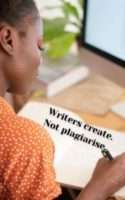Remember the hit song “Blurred Lines” by Robin Thicke ft T.I and Pharell? Did you know Thicke in 2018 had to pay $5 million which is 73 million in rands for illegally copying from Marvin Gaye’s “Got to Give It Up”. They were sued for plagiarism.
This does not just happen in the world of music. You can be sued for copying and pasting someone else’s work from a book, article, story, play or essay.
It’s important if you are using words that are not your original idea to cite the original source. If you don’t, then you are basically stealing and that is illegal.
What is plagiarism?
Dictionary.com describes plagiarism as:
“An act or instance of using or closely imitating the language and thoughts of another author without authorisation and the representation of that author’s work as one’s own, as by not crediting the original author.”
CopyLeaks gives us these examples of plagiarism:
Direct Plagiarism – is the most harmful, where a person uses another writer’s work while not properly mentioning the source.
Mosaic Plagiarism – is unintentional, they may have mentioned the source of the content but incorrectly referenced. It’s using words from the source but not with quotation marks, or paraphrasing bits to make it sound like your own.
Self-Plagiarism – is common to high schoolers who copy and paste parts of something they had already submitted before. Unless you get permission to do that, rather not do it – be safe not sorry.
Accidental Plagiarism – this one is also unintentional, they may misquote or cite the wrong author.
A real life example of the repercussions of plagiarism:
A story shared by Kori Morgan on an article from classroom.synonym.com titled, ‘What Are the Punishments for Plagiarism’ claims that journalist Jonah Lehrer was discredited after it was revealed that his book “Imagination: How Creativity Works” contained fabricated quotations. He was forced to resign from his job at the New Yorker magazine.
The 23rd of April is such a treat for book lovers as its World Book and Copyright Day, and International Day of the Book. To celebrate, FunDza hopes this article highlights the importance of avoiding plagiarism, and respecting the effort and creativity writers put into their work.
Did you know that people learn differently? Read more on how here
Tell us: Did you know plagiarism is illegal?


